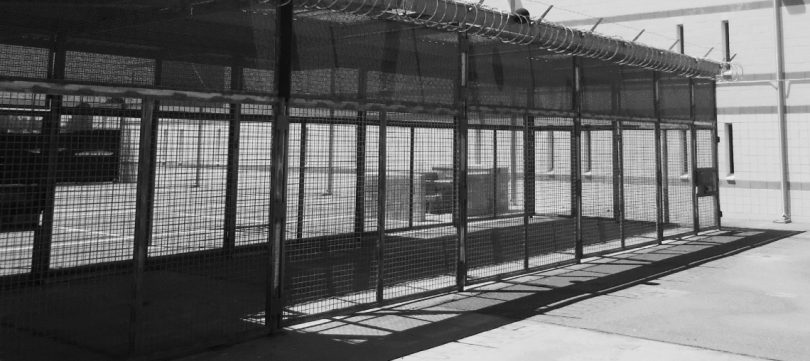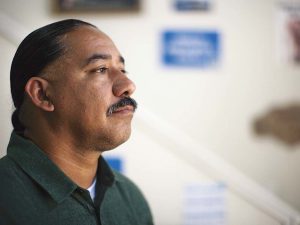by Israel Villa
As California continues down the path to transforming our youth justice system, with the closing of the Department of Juvenile Justice, the state’s youth prison program, concerns are growing that we may not see the wholesale transformation Governor Newsom promised. With the state shifting responsibilities for the youth once in DJJ to the counties, communities where families have been most impacted by the current system are calling on the governor and the state to honor the intent of juvenile justice realignment and make sure our children are protected from further harm.
I am a survivor of the school-to-prison pipeline. I was pushed out of school and spent close to 18 years as a prisoner of California’s oppressive and dehumanizing youth and adult punishment systems. I know about the trauma, abuse and neglect that happen every day across the state’s network of juvenile halls, probation departments, group homes and more. I have seen it firsthand. I have experienced the system’s many failures.
That’s why I was so excited when the governor signed Senate Bill 823 last September. His commitment to closing DJJ, and his pledge to end youth incarceration as we know it, were important. I also viewed the success of SB 823 as a triumph of the organizing work of directly impacted people. Formerly incarcerated and system-impacted young people and their families and communities rallied for juvenile justice transformation and it paid off.
Today, we are rising up again because we don’t like what we are seeing and hearing about how the state is moving toward implementation of this historic law. Here’s what SB 823 says about the shift in responsibilities to counties:
“It is the intent of the Legislature and the administration for counties to use evidence-based and promising practices and programs that improve the outcomes of youth and public safety, reduce the transfer of youth into the adult criminal justice system, ensure that dispositions are in the least restrictive appropriate environment, reduce and then eliminate racial and ethnic disparities, and reduce the use of confinement in the juvenile justice system by utilizing community-based responses and interventions.”
This was and remains the true promise of the law: to make sure counties protect our children’s wellness and well-being, not just shift the location of confinement. And yet we are now learning that the vast majority of counties are planning on using juvenile halls – restrictive and prison-like facilities built for short term stays – to house youth who are moved out of the state’s DJJ system.
This is unacceptable. It is directly counter to the governor’s promises. I am standing with my family, friends and neighbors to say loud and clear that county-level lock-up commitments must end. It is time for healthier, more effective alternatives to incarceration, both for those who are currently incarcerated at the county level and for realigned DJJ youth.
To succeed in transforming youth justice, California has to invest in strong state oversight, along with data and information sharing. We also need to support counties’ ability to adopt policies and practices consistent with the broader vision articulated in SB 823: “to promote trauma responsive, culturally informed services for youth involved in the juvenile justice system that support the youths’ successful transition into adulthood and help them become responsible, thriving, and engaged members of their communities.”
In order to support counties in implementing this broader vision of SB 823, the state must provide counties much needed flexibility by not prescribing probation as the sole recipient and administrator of funds that are meant to resource a broad range of supports and services for youth across California. The majority of the programs and services that youth require are beyond the wheelhouse of what probation is suited for. Additionally, counties like Los Angeles require county level flexibility. A state level prescription of probation involvement in the development of holistic youth support plans would only set counties back and continue to harm, ensnare and traumatize young people.
California must move in the direction of the governor’s vision—and our vision—of a health-centered, healing-focused, trauma-informed and strength-based approach to youth development and youth accountability. Ending our present dehumanizing and punitive youth incarceration system will not be achieved by solely closing our youth prisons. It will absolutely require significant and sustained change at the county level throughout the entire continuum of care for our youth and children.
The implementation of SB 823 must not only close DJJ the right way, but it must also ensure that the rest of this law is implemented in the right way, after DJJ’s closure. Too many people and families, particularly youth and families of color, have been harmed and continue to be harmed by the existing system. This is California’s chance to right those wrongs and show the rest of the country and the world what justice and opportunity look like.
Author Israel Villa is deputy director of the California Alliance for Youth and Community Justice
Postscript: For additional information on SB 823 and its passage you can find it here.



O.K. everybody
Google “Israel Villa” & see whassup.
Quite the stellar citizen, had to resign his position. Once a gangster…..
https://voicesofmontereybay.org/2019/10/24/how-a-criminal-organization-took-control-of-a-nonprofit-community-group-in-salinas/
This shouldn’t get purged, just info.
Jails and Prisons=Rehabilitation through de-humanization. This is what society wants – for criminals to be separated from civilization.
Israel: Were you factually innocent of the crimes you were charged with or were you a political prisoner?
Israel: Did you opt for the thug life because of chaos and dysfunction in you family gave you no other choice? Did this contribute to your failure to thrive in school? Did this lead to you joining the anti-social social club?
Just wondering.